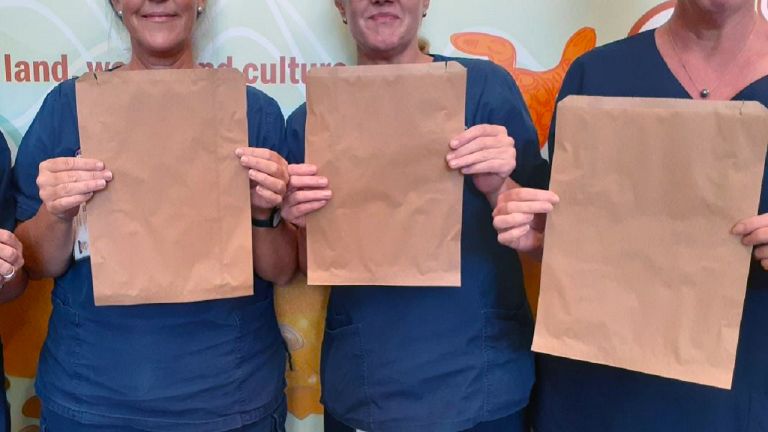About the project
Seven community nursing teams from the Greater Newcastle Sector collaborated with Hunter New England Local Health District (HNELHD) Procurement, Infection Control, and Wound Management teams to eliminate the use of 22,850 single-use zip-lock plastic bags each year.
Project details
The NSW Plastics Action Plan inspired a group of community nurses to review single-use plastic usage. With the recent plastic bag ban across NSW, they focused on single-use zip-lock bags for a quick sustainable win. Previously, community nurses used these bags to:
- Organise clinical supplies into patient packs daily.
- Transport supplies from the clinic to patients’ homes.
- Store open but unused medical products in patients’ homes between visits.
- Manage waste in patients’ homes.
Staff surveys were conducted to understand current practices and gather alternative solutions. Key considerations included:
- Cost neutrality.
- Availability via a statewide procurement contract and stocked in the OneLink Warehouse.
- Avoiding counterproductive reusable solutions requiring regular cleaning with single-use wipes.
- Complexity of alternative bags labelled as 'degradable,' 'biodegradable,' or 'compostable.'
Consumer feedback was also gathered to gauge their views on healthcare's environmental impact and interest in waste reduction.
The decision to switch from plastic to paper bags for organising and transporting clinical supplies was based on:
- Rapid change: Paper bags were readily available via the statewide procurement contract and stocked in the Onelink Warehouse.
- Cost: The price of paper bags matched that of the zip-lock bags.
- Disposal: Paper bags can be recycled in patients’ co-mingled recycling bins.
- Size: Smaller paper bags helped reduce staff overpacking and excess waste.
For storing open but unused medical products in patients' homes, patients provided a clean reusable plastic container. Nurses cleaned these containers with single-use wipes before placing any products inside. Nurses used clinical judgment to determine if it was appropriate to use open products.
Project outcomes
In the year before implementation, procurement data showed 22,850 single-use zip-lock bags ordered by community nursing teams. Since the project began, no zip-lock bags have been procured. The Sustainability Project Team plans to expand this project across all community nursing teams in the District.
Consumer feedback showed 74% of patients were interested in improving healthcare sustainability. Some comments included:
“There is a lot of waste for 10 minutes of drain care twice a week."
“All of the products used on me come in plastic… Why can’t all of this plastic be recycled?”
“Can recyclable products be used for care? Can you use less packaging, fewer gloves?”
The Put A Stop To Plastic Bags project has inspired community nursing teams to explore other sustainable practices. A staff survey revealed that 60% of clinicians now have a ‘sustainability lens’ in their practice. Comments included:
“Being mindful of waste and not packing items that may not be needed.”
“Improvising with simple products to reduce waste and cost, for example, not opening a whole dressing pack if I only need a bluey.”
“I’m questioning excess packaging on the products we use.”
